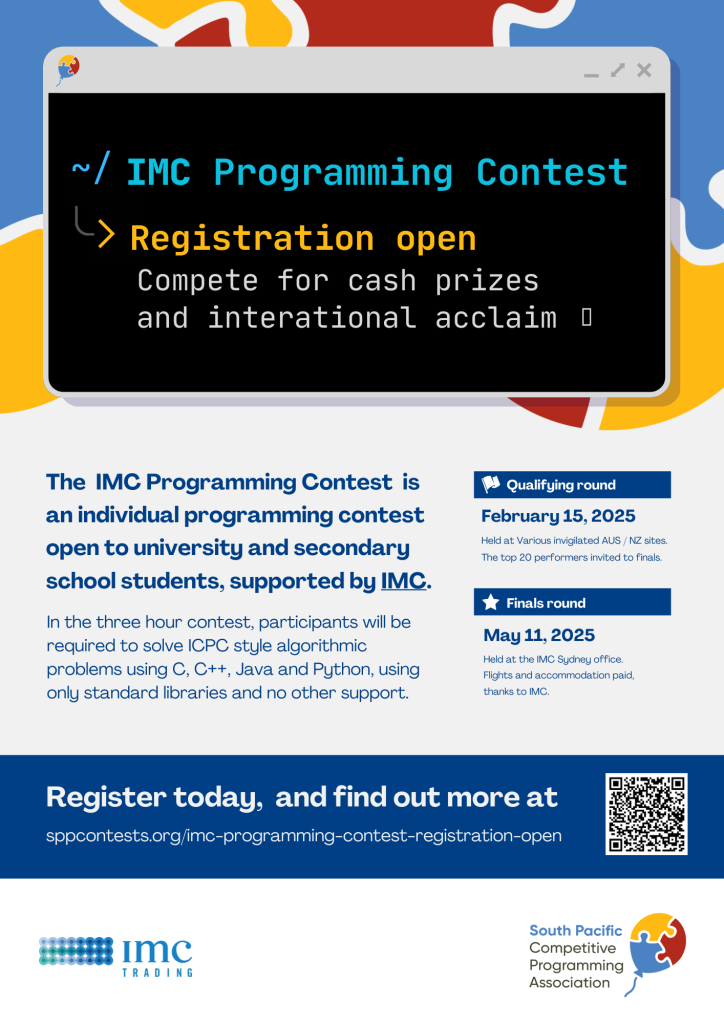The IMC Programming Contest is an individual programming contest open to university and secondary school students, supported by IMC.

The contest will be a three hour programming contest consisting of several ICPC-like questions.
A distributed preliminary round on 15th February will select finalists, who will then compete in an onsite contest in Sydney for the major prizes.
The onsite contest will be held on 11th May 2025 in Sydney and the finalists will have travel and accommodation provided.
You can register here.

Contest Information
Contest Format
Structure: The contest comprises several programming problems in no specific order. Problems are worth different amounts of points. Contestants will be ranked by total number of points for solved problems. Ties will be broken by time penalty.
Platform: The competition will be hosted on our own DOMjudge system that many will already be familiar with from ICPC and SPAR.
Specifically, we will use our contest portal (https://sppcontests.org/contest/) as the point of origin for the contest on the day. Currently, this is in a draft state. It contains useful information about the available languages (Python3/PyPy3, C/C++, and Java), compiler versions, memory limits, and instructions on how DOMjudge works. Please review the portal regularly for updates. Note that we are currently rebuilding the contest server (https://contest.sppcontests.org/) and have not yet finalised some rules such as the time penalty and scoreboard freeze duration.
Schedule
Preliminary Round: February 15, 2025, 12 noon – 3pm AEDT at various sites around Australia and New Zealand.
Onsite Final: May 11, 2025, at the IMC Sydney office.
| Time | Activity |
| 9.00am – 10.00am | IMC and SPCPC arrive |
| 10.00am – 10.20am | Contestants arrive |
| 10.30am – 11.00am | IMC Welcome and Charity talk/video |
| 11.00am – 12.00pm | Testing |
| 12.00pm – 1.00pm | LUNCH |
| 1.00pm – 2.00pm | Contest |
| 2.00pm – 3.00pm | |
| 3.00pm – 4.00pm | |
| 4.00pm – 4.15pm | Break |
| 4.15pm – 5.00pm | Award Presentation |
Practice Contest
A practice contest will be provided to help competitors familiarize themselves with the contest environment. Further details regarding this practice contest will be made available in the weeks before the contest.
Question Format
Problems will combine algorithmic and implementation challenges, emphasizing algorithmic thinking and problem solving.
Problems will be similar to other informatics contests such as the ICPC (https://icpc.global/) and the IOI (https://ioinformatics.org/)
Unlike ICPC some problems may have subtasks. That means you can get partial points for a problem. This is similar to the AIO (archived on https://orac2.info/) and IOI (https://ioinformatics.org/) contests.
We have information for preparing for programming contests in general on our website: https://sppcontests.org/training/
Rules
Your site coordinator will invigilate the contest to ensure fairness.
You must compete at an official site.
Internet access will be limited to the contest server
That means only access to https://sppcontests.org/contest/ and https://contest.sppcontests.org/ is allowed during the contest.
There will be no notes allowed. The only things you can use in the contest are pens/pencils, blank paper, a code editor, compiler, and a web browser accessing only https://sppcontests.org/contest/ and https://contest.sppcontests.org/
The use of generative AI methods is not permitted as it would violate the limited internet access rule and undermine the fairness of the competition. This restriction ensures that participants rely on their own skills and problem-solving abilities. This includes tools like GitHub Copilot, which use the internet to access AI inside development environments.
You will not be allowed to access, or refer to any prewritten code, or prepared code templates in the contest.
No communication with anyone is permitted during the contest, except: discussing urgent, non-problem set related questions with the site coordinator; or requesting clarifications from the judge team through the clarification system.
Any attempt to cheat or subvert the rules in any way will result in disqualification.
Contest Eligibility
- Eligibility: Open to university and secondary school students in Australia and New Zealand who are competing at an official site.
- The top 20 competitors will be selected for the onsite finals.
- Students of all levels (beginners and experience) are invited to participate
Prizes and Support
Finalists: The top 20 competitors will be invited to the final in Sydney, with travel and accommodation provided, thanks to the generous sponsorship from IMC.
Awards: Finalists will compete for cash prizes:
- 1st prize: $4000
- 2nd prize: $2500
- 3rd prize: $1000
plus bonus prizes for first to solve problems.
Confirmed Sites
Adelaide University
The University of Auckland
Griffiths University, Brisbane
Australian National University
University of Canterbury
Swinburne University
University of Western Australia
University of New South Wales